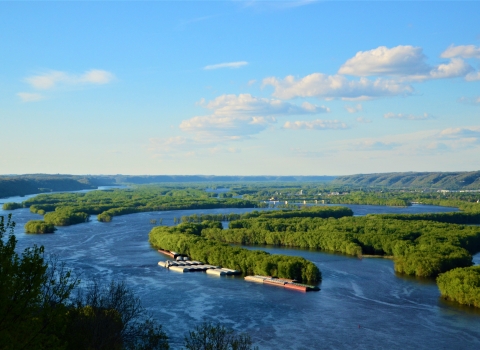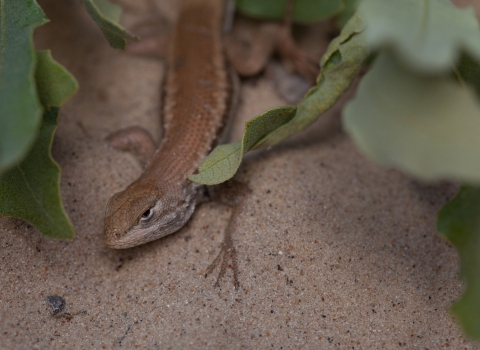Silver Spring, Maryland (September 13, 2021) – Zoos, aquariums, botanic gardens and other facilities across the nation that suffered significant revenue losses due to Covid-19 are receiving a boost to help with their continued care for threatened and endangered plants and animals. Today, the Association of Zoos and Aquariums (AZA) and the U.S. Fish and Wildlife Service announced Endangered Species COVID-19 Relief, funded by the American Rescue Plan. This call for proposals will reimburse facilities that had pandemic-related revenue losses of 25% or more to help cover the costs of their work to help protect these valued species.
Throughout the COVID-19 pandemic, many plant and animal care facilities had to shut down or significantly reduce public visitation. As of May 2020, 94 percent of AZA’s membership was closed to the public due to necessary pandemic precautions. Despite being closed to the public, zoos, aquariums and other partners such as science centers, botanic gardens and conservation centers, continued to provide exceptional care for the plants and animals at their sites.
While sustaining revenue losses well in excess of $2 billion, zoos, aquariums and other facilities found ways to continue their commitments to the rescue and recovery of endangered and threatened species while helping combat illegal wildlife trade.
As part of the American Rescue Plan Act of 2021 (P.L. 117-2), Congress recognized the dedication of these facilities in helping save animals and plants from extinction by appropriating $30 million to reimburse expenses related to the care of captive species listed under the Endangered Species Act (ESA), as well as rescued and confiscated wildlife that are at risk of extinction. This funding was provided by the Service to AZA to execute this program, consistent with direction from Congress.
AZA will be responsible for the overall administration and oversight of the funds, but eligible facilities do not have to be AZA-accredited or certified in order to receive Endangered Species COVID-19 Relief animal care reimbursements.
"For decades, zoos, aquariums, science centers and other facilities have been working with federal, state and Tribal wildlife officials to care for and house endangered species, often at the direct request of the federal government and at the expense of the facility," said Dan Ashe, President and CEO of AZA. "This funding recognizes the essential work that zoos and aquariums do in partnership with the federal government to help save species. The reimbursements will provide relief to those who experienced significant losses but maintained their commitment to some of the planet’s most endangered plants and animals. We are grateful to Congress and the Biden Administration for providing this crucial financial assistance."
"The U.S. Fish and Wildlife Service works with plant and animal care facilities to conserve, protect and restore threatened and endangered species," said Martha Williams, Principal Deputy Director of the Service. "The American Rescue Plan provides critical financial support to zoos, aquariums and other institutions that were severely impacted by COVID-19. By working with AZA to distribute these funds, we hope to provide some much-needed financial relief to those who help care for imperiled species."
Zoos, aquariums and other facilities work alongside the federal government to support recovery programs, rehabilitate injured animals, and help save endangered species from extinction, including manatees, sea turtles, black-footed ferrets, California condors, Florida corals, Mexican wolves, red wolves, southern sea otters and many others.
Funds will be directed toward reimbursing eligible facilities for the care of:
- U.S. native captive plant and animal species listed under the ESA.
- U.S. native ESA-listed animal species rescued from the wild because of injury, impending threats or impacts due to natural and human-induced activities.
- Animal species listed either in the Appendices of the Convention on International Trade in Endangered Species of Wild Fauna and Flora (CITES) or listed as threatened or endangered under the ESA that have been seized by a U.S. government agency and held at facilities for general animal care and welfare purposes.
Reimbursements are capped at $1 million per eligible facility. The applicable time period for reimbursement expenses is March 2020 to May 2021. Applicants may submit funding requests for all or some of this time period, provided the period is for a minimum of six consecutive months. Applicants must also certify that allowable expenses were not covered by other direct federal financial aid. Reimbursable expenses can include:
- Food.
- Veterinary care/medicine.
- Direct animal/plant care staff time.
- Life-support systems.
- Transport for medical, reintroduction into the wild, and captive breeding purposes.
- Real property debt and holding space improvements/modifications.
- Utilities essential for the care of species (e.g., electricity/gas/natural gas to power essential services).
AZA will hold a webinar and provide additional information to explain the application process, allowable expenses for reimbursement, and the deadline for application. More information about applying for the reimbursements and the upcoming webinar schedule can be found at aza.org/endangered-species-COVID-funding.
About AZA
Founded in 1924, the Association of Zoos and Aquariums is a nonprofit organization dedicated to the advancement of zoos and aquariums in the areas of conservation, animal welfare, education, science, and recreation. AZA is the accrediting body for the top zoos and aquariums in the United States and 12 other countries. Look for the AZA accreditation logo whenever you visit a zoo or aquarium as your assurance that you are supporting a facility dedicated to providing excellent care for animals, a great experience for you, and a better future for all living things. The AZA is a leader in saving species and your link to helping animals all over the world. To learn more, visit www.aza.org.
About the Service
The mission of the U.S. Fish and Wildlife Service is working with others to conserve, protect, and enhance fish, wildlife, plants, and their habitats for the continuing benefit of the American people. We are both a leader and trusted partner in fish and wildlife conservation, known for our scientific excellence, stewardship of lands and natural resources, dedicated professionals, and commitment to public service. For more information on our work and the people who make it happen, visit www.fws.gov



